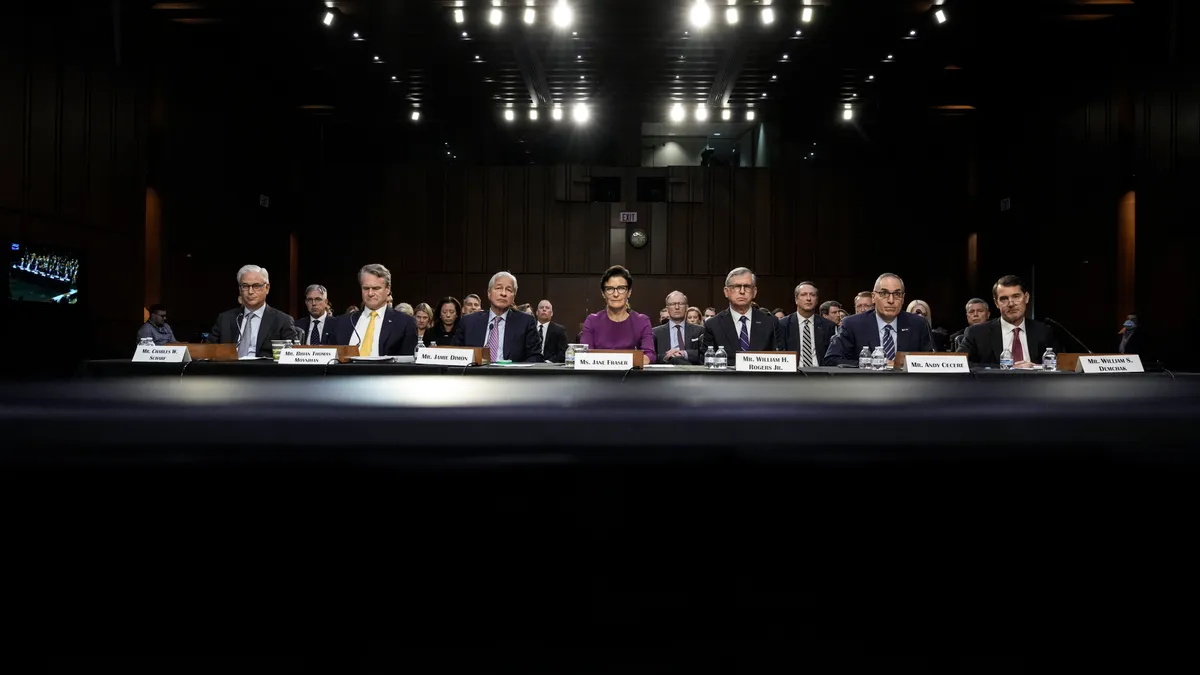Senate Democrats on Thursday pressed the CEOs of the nation’s largest retail banks to answer for scams associated with Zelle, a bank-owned peer-to-peer payments network, calling for the institutions to implement policies to protect and redress customers defrauded through the platform.
Zelle, a network designed to compete with P2P fintechs such as Venmo and Cash App, is owned by six of the seven banks represented at Thursday’s Senate Banking Committee hearing.
Sen. Elizabeth Warren, D-MA, called the network “unsafe,” claiming Zelle users were defrauded out of $500 million last year.
“You have created a perfect weapon for criminals to use and they have used it and you have not stood behind your customers,” she told the witnesses, which included the CEOs of JPMorgan Chase, Bank of America, Wells Fargo, Citi, Truist, PNC and U.S. Bank.
Warren’s rebuke of Zelle comes as she and fellow Sens. Robert Menendez, D-NJ, and Jack Reed, D-RI, claim banks have abdicated responsibility for fraudulent transactions made on the platform.
In a joint letter sent to Consumer Financial Protection Bureau (CFPB) Director Rohit Chopra in April, the Democratic lawmakers called on the regulator to expand the definition of “error payments” to include payments a consumer makes to a scam artist.
The lawmakers also called for the CFPB to issue guidance that would place the burden on banks to make consumers defrauded by such transactions whole.
JPMorgan CEO Jamie Dimon, who is no stranger to fiery exchanges with Warren, said his bank reimburses customers whose accounts have been hacked, a policy banks follow under Regulation E.
“Anything that’s unauthorized, we do cover,” Dimon told the senator, adding the amount of fraud on Zelle is “relatively small.”
Disputed transactions, including allegations of fraud, make up 0.06% of Zelle transactions on average, according to bank trade group the Bank Policy Institute (BPI), which cited 2022 survey data from eight of the largest U.S. consumer banks.
While banks bear responsibility for unauthorized transactions to scammers, consumer-authorized transactions made to fraudsters are another matter, said Dimon, who warned against going too far to expand Regulation E.
“If you simply said — ‘If you authorize a transaction, no matter what, you will be repaid if you claim it’s a scam’ — think of the problems of that,” Dimon said. “That’s why you can’t go all the way the other way either.”
PNC CEO William Demchak touted the platform’s security, claiming payment platforms that lie outside the bank network are rife with fraud.
“Zelle is just one of the P2P networks that you highlight, the others have 15 times the number of disputes coming into our company that we have no ability to have insight into,” Demchak told Warren.
Bank of America CEO Brian Moynihan told lawmakers the owners of Zelle, Early Warning Services, are working to better safeguard the network by closing accounts of scammers.
The network also cuts out lenders that fail to properly monitor customers accused of committing scams through Zelle, he added.
During the hearing, Warren also chastised the bank executives for not providing the committee with the data it requested regarding how many of their customers have submitted fraud claims related to Zelle.
Truist, Warren said, was the only institution to comply with the request. The Charlotte, North Carolina-based bank said it has received 52,000 claims of Zelle fraud, totaling $46 million, according to Warren.
The remaining CEOs said they would send the requested data by the end of the day.
“You've had two-and-a-half months to bring the data forward and have not produced any numbers on this,” Warren said.















